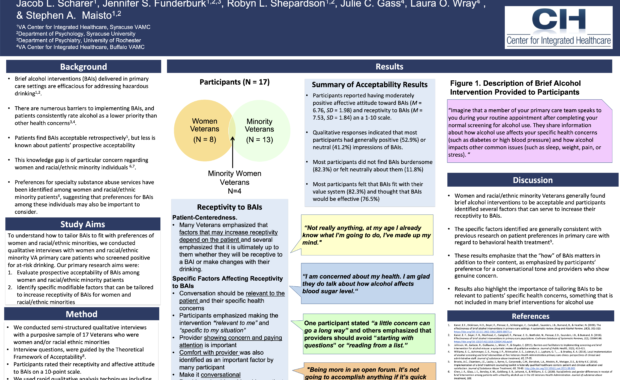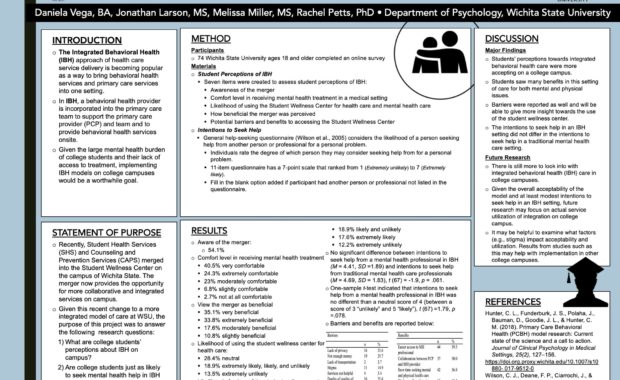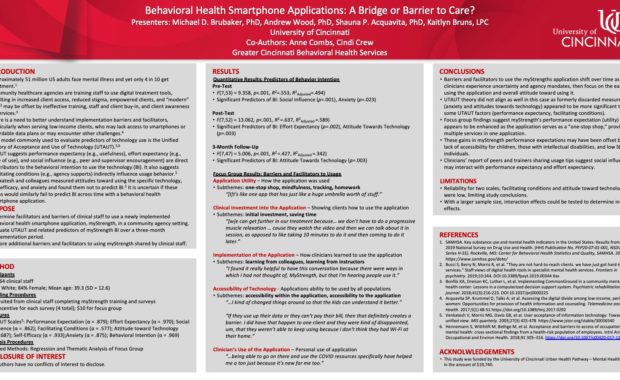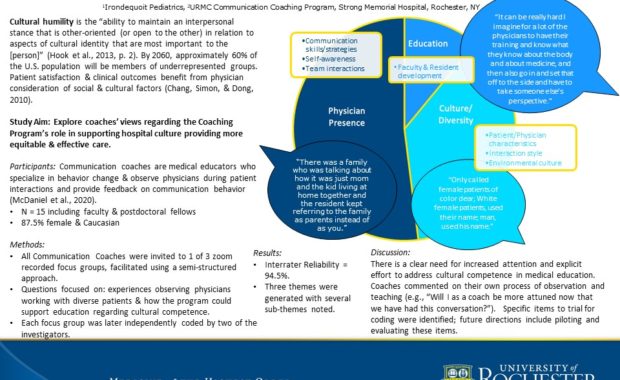Background. Integrated care programs that prioritize comprehensive service delivery for behavioral health conditions improve patient outcomes. This
Poster 22 – The Rutgers Integrated Care Evaluation Framework (The RICE Framework): An Innovative and Rigorous Set of Strategies to Evaluate Integrated Care Programs
Background. Integrated care programs that prioritize comprehensive service delivery for behavioral health conditions improve patient outcomes. This
K06 – The Spread of Innovation within CFHA: A Rising Tide to Lift All Boats
The CFHA listserv is a robust source of clinical innovation and has great potential for diffusion of ideas across its large network of clinical
K05 – Translating Evidence to Inform Policy Change: Ensuring your Research Generates Impact
Too often, completed research that has important implications for policy does not make it into the hands of the right audience or is not packaged in a
J03 – Examining Community Practice Readiness for Pediatric Primary Care Behavioral Health Services
This presentation examines the process of developing, implementing, and evaluating a community-based pediatric primary care behavioral health (PCBH)
F07 – Provider Satisfaction with Integrated Behavioral Health in a Rural Primary Care Practice
Background/rationale: The use of integrative models of care represent best practice for the treatment of anxiety and depression among primary care
B03 – Is PCBH and Employee Engagement really like Oil and Water? A System’s Journey to Achieve Both
The integration of behavioral health providers (BHPs) into primary care (PC) continues to proliferate and is fast becoming the expectation in
B01 – Developing Opportunities for Innovative Integrated Healthcare Program Implementation Amidst the Overwhelm of COVID-19
Community healthcare organizations are accustomed to managing staffing shortages, burnout, and overwhelm, but these challenges have been amplified
A06 – Radical Change: A Blueprint for Behavioral Health Innovation
While many organizations are increasingly receptive to and supportive of integrated behavioral health programs, the process of actual implementation
Poster 44 – Acceptability of Brief Alcohol Interventions Among Women and Racial/ethnic Minority Veterans in Primary Care
Brief alcohol interventions (BAIs) are effective for helping primary care patients reduce at-risk drinking, but there are numerous barriers to
Poster 26 – College Student Perceptions of Integrated Behavioral Health (IBH) Care on Campus
The purpose of this study was to understand college student perceptions of integrated behavioral health (IBH) care on a college campus and how likely
Poster 21 – Behavioral Health Smartphone Applications: A Bridge or Barrier to Care?
Approximately 51 million US adults face mental illness and yet only 4 in 10 get treatment. To be accessible and relevant across generations, community
Poster 20 – Implementation of the Integrated Behavioral Health Plus (IBH+) Services Model: Mixed Methods Evaluation of Baseline Contextual Factors
Background/Rationale: University of Colorado implemented Integrated Behavioral Health Plus (IBH+) services (team-based care with primary care
I04 – Evaluating Virtual Mental Health Care during the COVID-19 Pandemic: How to Conduct a Multi-level, Mixed Methods Evaluation of a System’s Shift to Virtual Care
In the early months of the COVID-19 pandemic, child and youth mental health agencies shifted to delivering their services through virtual platforms.
H03 – Multiplex ADHD Families in Pediatric Primary Care: Considerations for Screening African American Parents and Children
Multiplex ADHD families, where both a parent and a child have ADHD, are a common occurrence. Up to 50% of children with ADHD have one parent who also
E08 – Systematic Review of Methods used to Adapt Behavioral Health Treatments for Delivery by Non-licensed/lay Health Workers: Implications for Task-shifting in Research and Practice
"Task-shifting" or "task-sharing" is a dissemination and implementation strategy for increasing behavioral health care availability in lower-resource
K04 – Practical Recommendations for Conducting Implementation and Evaluation Projects on Clinical Interventions within Healthcare Settings
Abstract: Implementing and evaluating clinical innovations in healthcare settings is challenging, and the individuals conducting implementation
A08 – Improving Integrated Care: Using the PIP2 to Set Goals and Measure Practice Changes
Workshop Overview: Leaders in Integrated Behavioral Health can benefit from a tool that allows them to compare one primary care practice to another.




